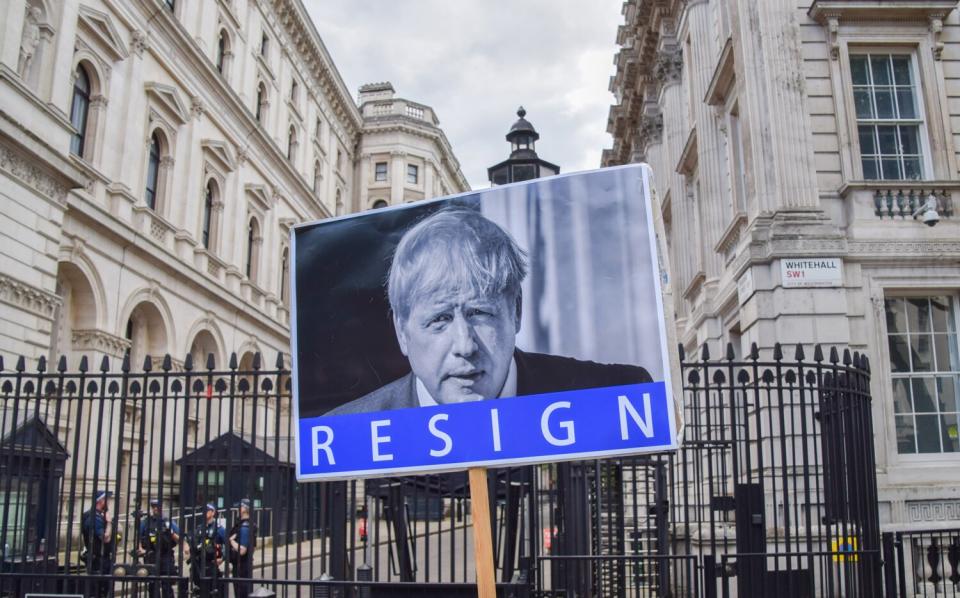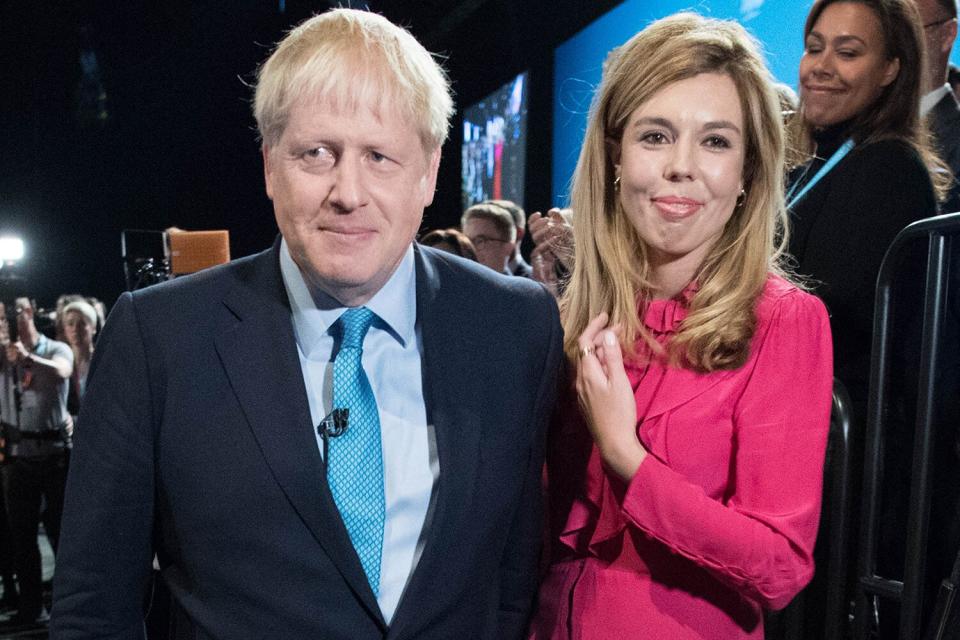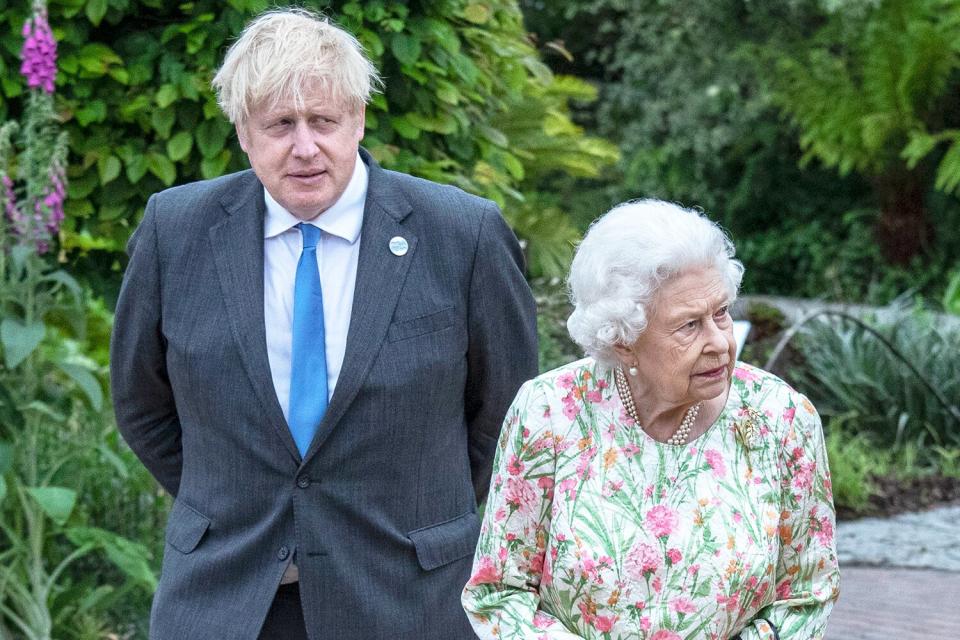Boris Johnson Survives Vote to Oust Him as British Prime Minister, but His Political Future Remains Uncertain

- Oops!Something went wrong.Please try again later.
- Oops!Something went wrong.Please try again later.
- Oops!Something went wrong.Please try again later.
- Oops!Something went wrong.Please try again later.
A Images via Getty Boris Johnson
British Prime Minister Boris Johnson is fighting for his political survival even after winning a vote of confidence by his own party's Members of Parliament on Monday.
The Conservative Party leader, 57, won 211 out of a possible 359 votes in an anonymous ballot in London, which was held after an unknown number of Conservative MPs submitted letters stating they could no longer trust him to effectively run the U.K. government.
It means that Johnson now faces the prospect of governing the U.K. without the support of a large percentage of his own parliamentary party — a situation that ultimately led to the downfall of Conservative governments helmed by Margaret Thatcher, John Major and Theresa May.

Vuk Valcic/SOPA Images/LightRocket via Getty A placard calling on Boris Johnson to resign
Despite this, Johnson was in typical bullish mood after the result was announced around 3 p.m. EDT.
"I think it's an extremely good, positive, conclusive, decisive result which enables us to move on and unite and focus," Johnson told the BBC. "What we need to do now is come together as a government, as a party, and that is exactly what we now can do."
The announcement of the confidence vote was made by leading backbench Conservative MP Sir Graham Brady on Monday morning, who stated that the threshold to trigger a leadership ballot under the rules of Conservative Party had been reached. This means that at least 54 Tory MPs submitted letters of no confidence to Brady in private.
This has been sent to Conservative MPs in the last few minutes: https://t.co/CeXlVIVZBl pic.twitter.com/mkJvELGmY8
— Chris Mason (@ChrisMasonBBC) June 6, 2022
After the prime minister earned 31 votes above the 180-vote threshold required to survive the takedown, Brady said, "I can therefore announce that the parliamentary party does have confidence."
But while Johnson's win technically keeps him safe, the sheer size of the rebellion against him may ultimately make his position untenable — as it did with May, his predecessor, who was forced out of Downing Street within seven months of winning her own confidence vote.
May and Thatcher both had a smaller percentage of rebels than Johnson when they were forced to resign, putting a dark cloud over Johnson's ministry.
Never miss a story — sign up for PEOPLE's free daily newsletter to stay up-to-date on the best of what PEOPLE has to offer, from juicy celebrity news to compelling human interest stories.
Johnson's confidence vote was largely prompted by the Covid-19 "Partygate" scandal, where 16 social gatherings were found to have taken place in Downing Street during a 20-month period of various levels of COVID-related lockdowns in England.
In April, Johnson was fined by the Metropolitan Police for the parties, becoming the first U.K. Prime Minister in history to be officially found to have broken the law.

Stefan Rousseau/WPA Pool/Getty Boris Johnson and Carrie Johnson
In a statement shared on April 12, Johnson said he "received a fixed penalty notice from the Metropolitan Police relating to an event in Downing Street on 19th June 2020," adding that he paid the fine "immediately" and issued an apology.
"In a spirit of openness and humility, I want to be completely clear about what happened on that date," he continued, noting the eight meetings he oversaw at Downing Street (a.k.a. Number 10) that day, which included a committee sit-down about a plan for COVID-19. Johnson, 57, added that he left Downing Street for several hours to visit a school in Hemel Hempstead.
"And amongst all these engagements, on a day that happened to be my birthday, there was a brief gathering in the Cabinet Room shortly after 2pm, lasting for less than 10 minutes, during which people I work with kindly passed on their good wishes," he explained.
In a separate development, senior British civil servant Sue Gray, who oversees ethics inquiries for the British government, published a highly critical report into the Downing Street parties on May 25 — including one that continued until 4am on the eve of the funeral of Prince Philip in Windsor Castle.

Jack Hill/WPA Pool/Getty Images Boris Johnson and Queen Elizabeth
"Against the backdrop of the pandemic, when the Government was asking citizens to accept far-reaching restrictions on their lives, some of the behavior surrounding these gatherings is difficult to justify," Gray said in the report.
"At least some of the gatherings in question represent a serious failure to observe not just the high standards expected of those working at the heart of Government but also of the standards expected of the entire British population at the time."
After Gray's findings were published, Johnson made a statement at the House of Commons, telling members of Parliament, "I am humbled and I have learned a lesson."
His political opponents, however, are already suggesting that his time inside Downing Street is now drawing to a close.
Opposition Labour Party leader Sir Keir Starmer told LBC Radio on Monday that that the confidence vote represented "the beginning of the end" for Johnson, adding that the Tory MPs had "to show some leadership and vote against the prime minister" in the national interest.
Liberal Democrat leader Sir Ed Davey tweeted, "It's judgment day for Conservative MPs and their sleaze-ridden prime minister.
"If they fail to sack Boris Johnson, it will be an insult to all those who made sacrifices and suffered while he partied."

